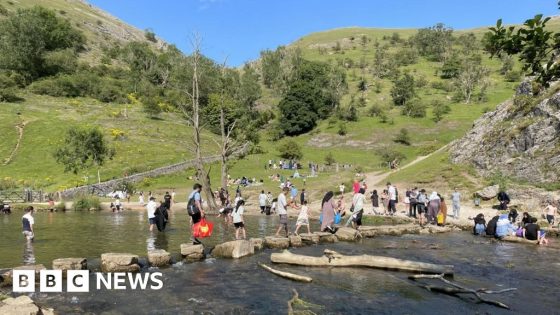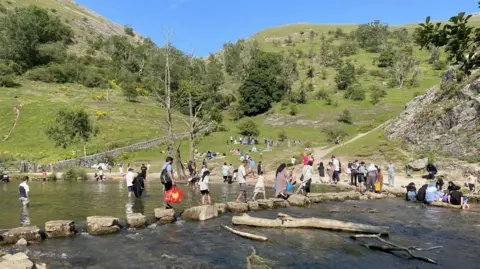 BBC
BBCFor many years, Dovedale’s stepping stones have provided the perfect platform for walkers to access hikes up the valley across the River Dove in the Peak District.
First laid in about 1890 for Victorian tourists, people can walk between Derbyshire and Staffordshire by crossing the stones.
But in recent times, the beauty spot has been plagued by bad weather and safety issues, and last year the stones were officially closed after they were badly damaged when Storm Babet hit in October.
A bridge a few hundred metres downstream provides a safe route across the river, but crowds continue to cross the stones, which were thrown into the spotlight after police launched an investigation into a confrontation between two groups of people late last month.
So what is it about this closed landmark that attracts people from far and wide?
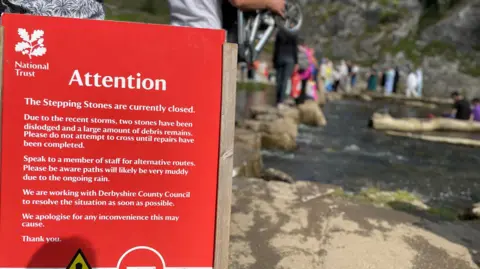
What sparked the confrontation?
Mobile phone footage captured on 27 July showed sticks being waved and punches thrown at the stepping stones.
Derbyshire Police confirmed it had reports of a fight at 14:30 BST, including claims from a caller that a child in his party had been hit, and that an attempt was made to steal his wife’s purse.
No arrests have yet been made, the force told the BBC.
The National Trust, which owns the land, said it understood that “disturbances of this kind can be upsetting for visitors”.
A spokesperson added: “We’d also like to remind visitors that the stepping stones are currently closed because of storm damage and signs are in place asking visitors not to use them.”
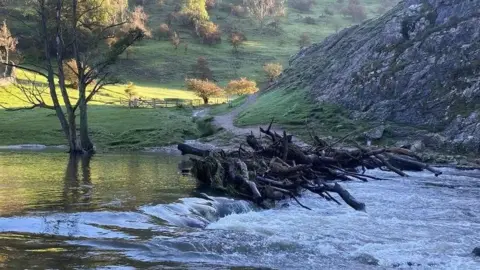 National Trust
National TrustHow have the stepping stones changed in recent years?
The stones were acquired by the National Trust in 1934, and Dovedale was declared a National Nature Reserve in 2006 in a bid to further protect it.
Four years later, renovation work saw limestone blocks cemented on top of the slabs, which sparked accusations that it had spoiled the stones’ natural beauty.
The famous stones, which have featured on postcards of the Peak District, were also dislodged in July 2012 and in December 2016.
And last year, the trust said two stones had been “toppled over” by debris, which was washed down the river.
Derbyshire County Council, which is responsible for the repairs, said it had permission from Natural England to work at the spot – because it is a site of special scientific interest.
However, no date for the repairs has yet been set.
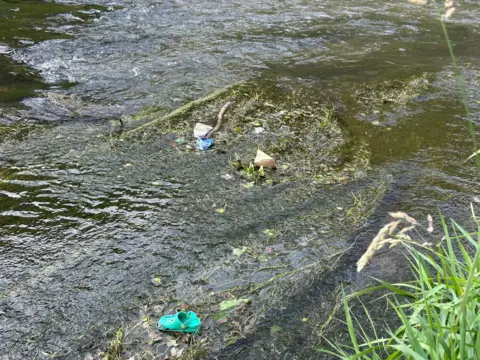 Andrew Trickey
Andrew TrickeyWhat do people in Dovedale say?
In addition to the crowds seen during the confrontation, a simple search on Facebook or TikTok returns a variety of recently posted pictures and video showing groups of people crossing the stones.
Dovedale and its river were immortalised by Izaak Walton in his famous 17th Century fishing book, The Compleat Angler.
Staff from a hotel nearby that bears the writer’s name – the Izaak Walton Country House Hotel – described the spot as “stunning”.
But deputy manager Chris Rushton said: “They [the crowds] queue from both sides to try to cross from both ways.”
On the issue of overcrowding, a National Trust spokesperson said it was about balancing the provision of access “with the needs of the environment and local communities”.
“The stepping stones are a public right of way leading out into the open countryside of the Peak District,” they said.
“Since the stepping stones were damaged during Storm Babet, we have tried to keep as much of the area open to visitors as possible, with signage in place to advise visitors not to use them and we have suggested alternative routes.”


‘Like walking into a high street shop’
By Matthew Barlow, BBC News
I joined BBC Radio Derby in 2006 and have been to Dovedale on many different stories over the years, but I have never seen it as busy as it was late last month.
Usually, when walking to the stepping stones on the path along the river from the car park, I would pass the occasional hiker and say “hello”.
But this time it was like walking into a high street shop during the opening hours of a Boxing Day sale.
The people going there are of all ages and most of them don’t stray far from the stepping stones.
There was litter on the ground in this area and through the clear water, you could see plastic bottles and food wrappers on the river bed.
And industrial-sized bins in the main car park were overflowing after that weekend.

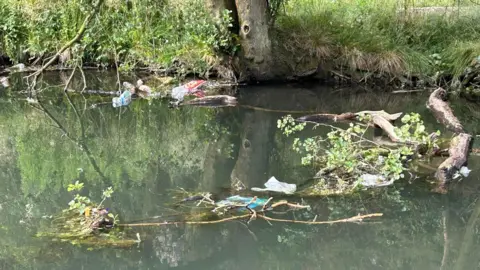 Andrew Trickey
Andrew TrickeyAnd what have some left behind?
Large crowds often mean large amounts of litter – which has been sighted across the area.
Visitors to the beauty spot said that while they saw litter-pickers, there was still “plenty” of rubbish.
Amy Faulkner and Mitchell Lamarca, from Leicester, arrived to the area early in the day and said it was a “bit of a shock” to see so much litter.
Ms Faulkner said she had seen discarded banana skins and nappy bags at the site.
“I’ve put all my rubbish in my bag because I haven’t seen a single bin,” she added.

Similarly, Rachel Scully, from Windsor, said: “I have noticed plastic bottles in the river here but also I would say I haven’t seen any bins either.
“I’ve had to take my dog waste up the top of Thorpe Cloud and bring it back down, but I will take it with me.”
Darren Walker, from Stoke-on-Trent, described the rubbish left behind as “disgusting”.
“People want to come here and enjoy the nice clear water but everybody dumps their litter,” he said.
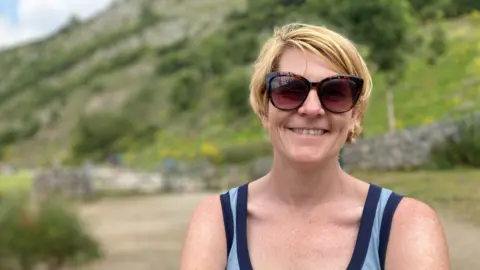
A spokesperson for the National Trust said Dovedale was “understandably one of the Peak District’s most popular locations” due to its “beautiful scenery”, but said the “downside” was that it brought a “litter problem”.
They said: “We encourage visitors to dispose of rubbish responsibly.
“There are bins in the main car park where service vehicles are able to empty them regularly.
“There are also signs to let people know that they are entering a nature reserve and, as with other open countryside areas, they should either bring rubbish back to these bins or take it home with them.”
The spokesperson added outdoor teams “work tirelessly to look after the area and clear the site by carrying out regular litter picks and encouraging people to leave no trace”.
They said: “We want people to continue to come along and enjoy the countryside, but we would like to encourage everyone to take their litter away with them and bin it.”
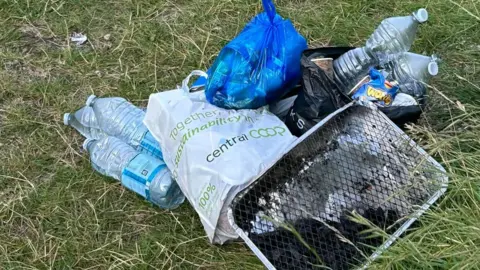 Andrew Trickey
Andrew Trickey
Source Agencies

